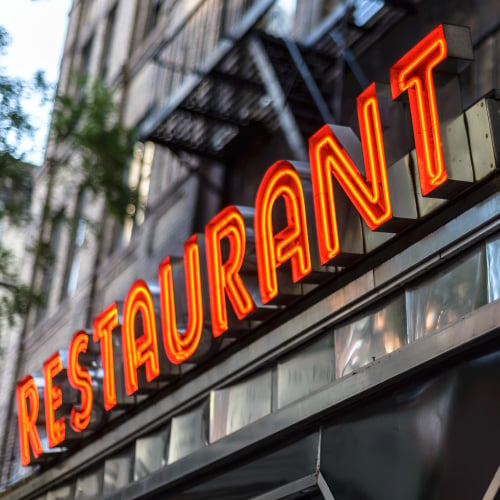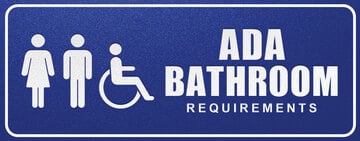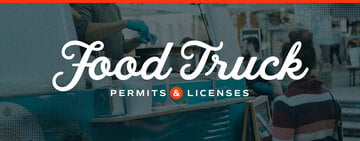

Opening a restaurant takes more than acquiring startup cash, finding a location, and writing a menu. It requires a foundation established with restaurant licenses and permits. Getting the writs and proofs you need for each restaurant license takes time, so it's important to start the process as early as possible.
We explain what you can expect with each of the following business licenses and permits as you work towards opening your restaurant.
Click any of the license types below to read the section that interests you:There are some licenses and permits that are necessary to open a restaurant. Failure to obtain them can result in penalties from multiple agencies or even prevent you from opening your location at all. Receiving legal counsel may help you map out the steps and ensure that nothing is missed according to the laws in your restaurant’s city and state. It’s easiest to work your way down from the top, starting with the required restaurant business licenses and ending with location-specific permits you may encounter.

A business license gives you the authority to operate in your jurisdiction. The exact form of this license is dependent on your restaurant’s location and address. If you plan on selling alcohol, you will need a federal business license as well as a state business license.
To get a business license, you will want to work through your city and state government. The easiest way to start would be to search your state’s name plus the term “business license” in an online search engine. This will bring up your state’s government website where the application and procedures can be found. For more information, you may use the US Small Business Administration’s website to look up your state and city-specific rules for receiving a business license.
A business license can cost around $50 to register. However, the cost of a business license itself varies depending on your business type, location, and expected profit. You will need to renew this license annually or every few years depending on your location.
An employer identification number (EIN) essentially tells the federal government that you are an employer and provides you with a tax ID. With this number, you can hire employees and have them on a legal payroll. Your state will give you an employer identification number that is separate from your federal number, which helps legitimize your business's standing.
To get an EIN, you will want to visit the IRS’s website and follow the application process listed there. This can take a while since the IRS only issues a limited number of employer identification numbers per day. Be sure to apply as early as possible. You can also fax, mail, or call the IRS to submit your application.
An EIN is free but takes time to obtain.
A certificate of occupancy indicates that the building where your restaurant is located has passed its final inspection. It deems the building safe to operate in.
To receive a certificate of occupancy, your location will need to be inspected by your local building or zoning department. To arrange the appointment, search your state’s name plus the term “certificate of occupancy” in an online search engine to find the information on your state government’s website. This certificate may also include a city and fire permit issued by your local fire marshal.
A certificate of occupancy will cost around $250.
A food service license, or food permit, shows that a restaurant meets all food preparation, storage, and safety regulations, and they have been granted a license to sell food. It ensures that your location is in accordance and up-to-date with the restaurant food safety laws.
The city or county Health Department issues food service licenses and requires an inspection to take place. Depending on your county, you may need to complete a food safety training program or earn a food handler’s permit to get approved for a license. The Health Department will inspect your restaurant regularly to make sure that the expected standards are being maintained. To apply, start by reviewing the food vendor’s application requirements on your state government’s website. You may then apply directly online.
A food service license can cost around $50 to register. However, the cost of the license itself varies by type of food establishment, location, and the number of employees. The fees are determined at the time of the inspection and typically range from $100 to $1000. You will need to renew these licenses periodically as well.

A sign permit allows you to display or change permanent signage outside your restaurant’s building. In many counties, signage size, brightness, and location are regulated and need to be approved beforehand. Receiving the permit shows that you have met the standard and codes required and can proceed in adding the sign.
To apply for a sign permit, you will want to visit your local county government’s website for the steps and application. This will involve working with a sign contractor and the Zoning Department. You must provide a scale drawing of the signage, and often you will need to submit variations for approval. If your sign includes lighting, you may also need to provide the wiring and circuit plans you intend on establishing. Requirements may vary depending on the size and type of sign.
The cost of a sign permit will depend on the estimated cost of your sign, including the cost of labor, materials for your signage, and its size. You can expect a typical starting range of $20 to $50.
A building health permit shows that your restaurant building and practices comply with sanitation regulations. Typically, you will only need a building health permit if it's a new construction. However, your county may require it for older buildings as well to ensure a sanitary work and dining environment.
A building health permit is issued by your local government. To confirm if you need one and apply, search your state’s name plus the term “building health permit” in an online search engine. To maintain this permit, your location will be subject to routine inspections.
You can expect a building health permit to cost somewhere between $50 and $1000. Some factors that can affect the cost are the building’s age and location.
An employee health permit, also known as a food handler’s permit, indicates that a specific employee has passed a course educating them on proper health and safety practices in a commercial kitchen. The course teaches employees about proper food storage and food handling practices along with proper sanitation practices to avoid cross-contamination.
An employee health permit is provided after an employee completes a state-approved food handler’s course and passes the final test. To find the course selected by your state, search your state’s name plus the term “employee health permit” or “food handler’s permit“ in an online search engine.
An employee health permit can cost anywhere from $100 to $500 and must be periodically renewed.
Aside from the required permits and licenses, there are others you may need to obtain depending on what additions you are looking to make to your restaurant. It is important to familiarize yourself with the following permits, in case you run into them down the line.
If you’re ever concerned that you may accidentally miss a permit, be sure to divulge your full business plan with your legal counsel so they may identify permits you still need to apply for. Below is a quick review of just some additional permits you may encounter.

The process for obtaining a liquor license can vary from state to state and city to city. You will want to check with your local government for the processes and regulations you must abide by in your jurisdiction. A liquor license tends to be one of the most regulated and strict licenses you may encounter.
In some locations, you may be required to get both a liquor license and a beer and wine license if you are looking to serve all three. Remember to apply early, since the application process can take as long as a year. The fees will vary depending on your location, and the bar license will need to be renewed each year.
Choosing the right music for your restaurant can be a challenge, but you've got time to figure it out. You need a music license to play music from any platform in your restaurant. So, while you're perfecting your playlist, apply for a music license to abide by copyright laws. You can work with several companies to use the music they have rights to, such as the American Society of Composers, Authors and Publishers, or Broadcast Music Incorporated. No matter where it's coming from, you need a license to play music in your restaurant. The pricing can vary but is usually between $250 and $500. A live entertainment license is a similar permit you may also be interested in researching.
A resale permit, also known as a reseller permit or a resale license, prevents double taxation on a product by collecting tax when your customer buys the product, rather than when you purchase the product initially. A resale certificate is generally only needed if your restaurant is located in a state that issues sales tax, such as California, where a California resale certificate is needed. You can register online with your local government to receive a tax-exempt certificate. The fees vary depending on your security deposit amount but can be anywhere from $0 to $50.
A seller's permit, or a sales tax permit, indicates to the state that your business collects sales tax during customer purchases. In various states, you'll need both a seller's permit and a resale permit for proper taxation documentation. Restaurant wholesalers like WebstaurantStore can obtain a sales tax permit from your local government's website and only requires a security deposit determined at the time of your application.
If you are going to need dumpsters for your restaurant, you may also need a dumpster placement permit. This would allow you to place a dumpster outside your facility that can then be used for food waste and trash disposal. The costs for the permit can vary depending on the placement and size of the dumpster, along with the location of your establishment.

One license that can easily be forgotten is a pool table permit. Some states regulate billiard tables and require business owners to register them before use. A pool table permit can limit the hours of operation of the billiard area and even the number of pool tables in an establishment. The fees can vary on your location and how many tables you want to add. The permits also need to be renewed annually.
The need for a valet parking permit can vary from state to state. If you plan to have valet parking for your restaurant, check with your local government to see if you need a permit. If so, you may need to present a detailed plan of your valet service, indicating the pick-up and drop-off points, the number of parking spaces, how payment will be collected, and letters of agreement from your designated drivers. The fees associated vary depending on your state.
No matter what type of restaurant or food service operation you're starting, obtaining the correct permits and licenses is essential to your success. With penalties that can affect your bottom line or even close your doors, you will want to thoroughly research the restaurant licenses you need and start the application process early to allow them time to be issued.
The information provided on this website does not, and is not intended to, constitute legal advice. Please refer to our Content Policy for more details.
The information provided on this website does not, and is not intended to, constitute legal advice. Please refer to our Content Policy for more details.

ADA Bathroom Requirements for Restaurants
ADA restroom requirements are an essential aspect to consider when designing or renovating a restaurant. These requirements are outlined by the Americ

Grand Opening Ideas for Your Restaurant
A grand opening is a great marketing strategy to create buzz in the local community before you open a new restaurant. This event will serve as your fi

Food Truck Permits and Licenses
Opening up a food truck business can be an exciting venture, but you'll need to acquire the appropriate permits before hitting the streets. Food truck